| Topic: Take a Moment to Honor Our Fallen Soldiers | |
|---|---|
|
Edited by
Rapunzel
on
Thu 03/26/09 08:35 PM
|
|
 |
|
|
|
|

|
|
|
|
|
|
Are Canadian soldiers included? Cheers everyone.  |
|
|
|
|
 |
|
|
|
|
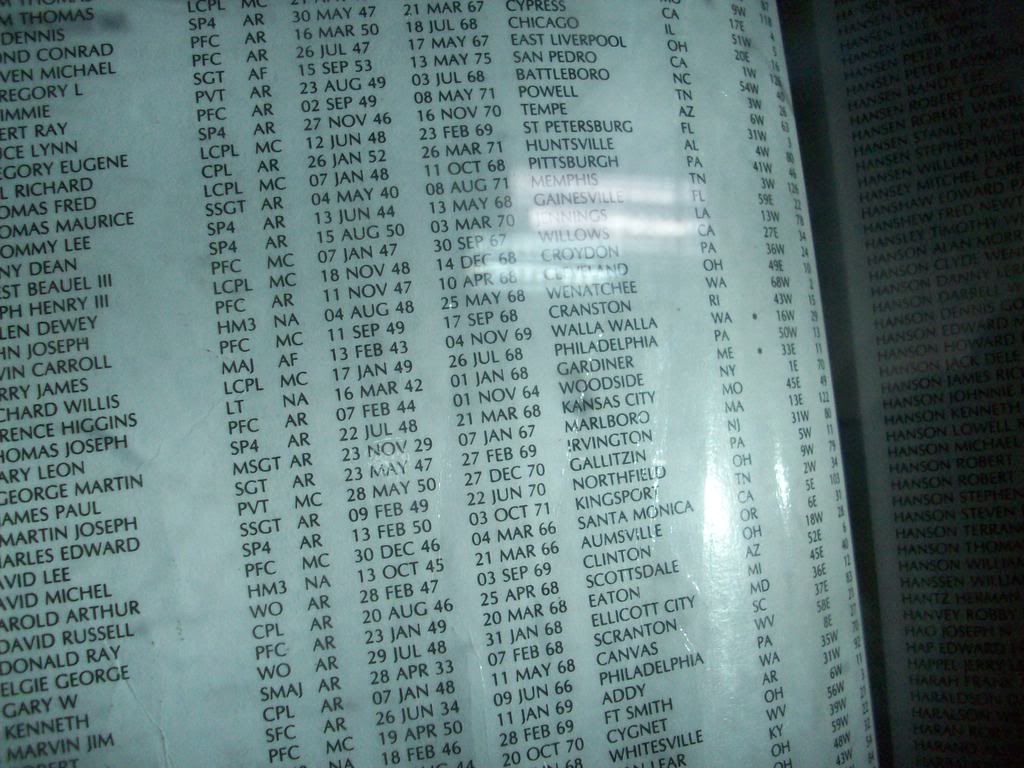
|
|
|
|
|

|
|
|
|
|

|
|
|
|
|
|
Edited by
Rapunzel
on
Sun 03/29/09 06:20 PM
|
|
|
http://guelph.ca/museum/mccrae/story_of_john_mccrae.htm
The Story of John McCrae By John Peddie John McCrae is the author of the famed poem, In Flanders Field, written during the First World War. John was born in 1872 and raised in Guelph, Ontario and is remembered as one of Guelph's most famous sons. McCrae was more than a poet, and was in fact a doctor, soldier, author and artist. The paternal grandparents of John McCrae, Thomas and Jean (nee Campbell) emigrated to Canada from Scotland in 1849 and settled in Guelph. Their son David married Janet Eckford and they had three children; Thomas (1870), John (1872) and Geills (1878). John's early education was received in Guelph, first at Central Public School and subsequently at Guelph Collegiate Institute. While at Guelph Collegiate, John joined the Highland Cadet Corps which was affiliated with the school. One year later, at the age of 15, McCrae became a bugler in the local militia regiment of artillery commanded by his father. He later joined this same regiment as a gunner. At the age of 16, John was awarded a scholarship to the University of Toronto (left photo) due to his academic achievement at Guelph Collegiate. McCrae attended classes at the University of Toronto until 1892-3, when he took a year off his studies due to recurring problems with asthma. During this break from university John was a resident master in English and Mathematics at the Ontario Agricultural College (O.A.C.) in Guelph. After returning to Toronto and completing his B.A., John commenced studies in medicine at the University of Toronto and did a medical residency at the Garrett Hospital, a Maryland children's convalescent home. While at university, John maintained his military ties with the No. 2 Battery in Guelph. He remained a member of the Guelph militia regiment and was promoted several times, finally making the rank of Lieutenant. At the same time he was also involved with a Toronto militia, the Queen's Own Rifles, in which he rose to the rank of Captain and commanded the company. It was also while John was still at University that some of his early poems were first published. Although McCrae is widely known as a poet, his literary efforts were not confined to one genre. While at university he also had some of his short stories published and he later went on to write scientific articles and medical textbooks. As well as his literary efforts, John dabbled in the visual arts, making numerous sketches throughout his life. John McCrae graduated at the top of his class in medicine at the University of Toronto, and in 1899 was awarded a fellowship in pathology to McGill University in Montreal. This award coincided with the start of the Boer War (1899-1902) and John put off accepting the fellowship in order to go to South Africa with the artillery. McCrae left for South Africa in 1900 in command of the left section of D Battery of the Royal Canadian Artillery attached to the Second Canadian Contingent. This contingent returned to Canada in 1901 after participating in several major campaigns. With his return McCrae accepted the fellowship at McGill, which he completed in 1905. While still working on this fellowship, McCrae was appointed special professor in pathology at the University of Vermont, a position he held until 1911. During this time he was also appointed an associate of medicine at the Royal Victoria Hospital in Montreal and was a lecturer in pathology and medicine at McGill University. After completing the fellowship McCrae was employed as a pathologist at Montreal General Hospital and as a physician at the Royal Alexandra Hospital for Infectious Diseases, also in Montreal. In 1910, Lord Grey, then Governor General of Canada, undertook an expedition by canoe from Lake Winnipeg to Hudson's Bay. John McCrae accompanied this voyage as expedition doctor. When the first World War began in 1914, McCrae again offered his services to the military. He was conditionally offered the position of Brigade Surgeon in the First Brigade of Canadian Field Artillery by E.W.B. Morrison, the brigade commander and a friend of McCrae. McCrae was formally confirmed in this position in the fall of 1914. While Brigade Surgeon, John was responsible for a field dressing station at the front and treated those wounded during the Second Battle of Ypres (Ieper) in the spring of 1915. As well as performing his duties as surgeon, he also served on the guns when needed and occasionally performed burial services. It was after performing the service for a friend, Alexis Helmer, that McCrae was inspired to write In Flanders Fields. The poem was written May 3, 1915 and first published in Punch that same year. In the summer of 1915, McCrae was transferred from the artillery Brigade to the Number 3 Canadian General Hospital in France, where he was second in command of medical services. During McCrae's time there, the Number 3 Hospital received a visit from Queen Mary, who toured the hospital. McCrae disliked these official visits as he felt they detracted from the real work of the hospital. While still at this hospital in January 1918, McCrae became ill with pneumonia, which was soon complicated by meningitis. Four days before he died, he was honoured by being the first Canadian appointed as consulting physician to the First British Army. John McCrae died on 28 January 1918, and was buried with military honours at Wimereaux Cemetery in France. At McCrae's funeral procession, 75 nursing sisters stood by to watch and McCrae's horse, Bonfire, wore his master's boots backwards in military tradition. Return to guelph.ca/museum In Flanders Fields By John McCrae In Flanders fields the poppies blow Between the crosses, row on row, That mark our place; and in the sky The larks, still bravely singing, fly Scarce heard amid the guns below. We are the Dead. Short days ago We lived, felt dawn, saw sunset glow, Loved, and were loved, and now we lie In Flanders fields. Take up our quarrel with the foe: To you from failing hands we throw The torch; be yours to hold it high. If ye break faith with us who die We shall not sleep, though poppies grow In Flanders fields.  http://www.arlingtoncemetery.net/flanders.htm McCrae's "In Flanders Fields" remains to this day one of the most memorable war poems ever written. It is a lasting legacy of the terrible battle in the Ypres salient in the spring of 1915. Here is the story of the making of that poem: Although he had been a doctor for years and had served in the South African War, it was impossible to get used to the suffering, the screams, and the blood here, and Major John McCrae had seen and heard enough in his dressing station to last him a lifetime. As a surgeon attached to the 1st Field Artillery Brigade, Major McCrae, who had joined the McGill faculty in 1900 after graduating from the University of Toronto, had spent seventeen days treating injured men -- Canadians, British, Indians, French, and Germans -- in the Ypres salient. It had been an ordeal that he had hardly thought possible. McCrae later wrote of it: "I wish I could embody on paper some of the varied sensations of that seventeen days... Seventeen days of Hades! At the end of the first day if anyone had told us we had to spend seventeen days there, we would have folded our hands and said it could not have been done." One death particularly affected McCrae. A young friend and former student, Lieut. Alexis Helmer of Ottawa, had been killed by a shell burst on 2 May 1915. Lieutenant Helmer was buried later that day in the little cemetery outside McCrae's dressing station, and McCrae had performed the funeral ceremony in the absence of the chaplain. The next day, sitting on the back of an ambulance parked near the dressing station beside the Canal de l'Yser, just a few hundred yards north of Ypres, McCrae vented his anguish by composing a poem. The major was no stranger to writing, having authored several medical texts besides dabbling in poetry. In the nearby cemetery, McCrae could see the wild poppies that sprang up in the ditches in that part of Europe, and he spent twenty minutes of precious rest time scribbling fifteen lines of verse in a notebook. A young soldier watched him write it. Cyril Allinson, a twenty-two year old sergeant-major, was delivering mail that day when he spotted McCrae. The major looked up as Allinson approached, then went on writing while the sergeant-major stood there quietly. "His face was very tired but calm as we wrote," Allinson recalled. "He looked around from time to time, his eyes straying to Helmer's grave." When McCrae finished five minutes later, he took his mail from Allinson and, without saying a word, handed his pad to the young NCO. Allinson was moved by what he read: "The poem was exactly an exact description of the scene in front of us both. He used the word blow in that line because the poppies actually were being blown that morning by a gentle east wind. It never occurred to me at that time that it would ever be published. It seemed to me just an exact description of the scene." In fact, it was very nearly not published. Dissatisfied with it, McCrae tossed the poem away, but a fellow officer retrieved it and sent it to newspapers in England. The Spectator, in London, rejected it, but Punch published it on 8 December 1915. |
|
|
|
|
|
Edited by
Rapunzel
on
Sun 03/29/09 06:24 PM
|
|
|
http://www.5rcamuseum.ca/id39.htm
The Story of "In Flanders Fields" Virtually every Canadian knows the poem "In Flanders Fields" by heart, but few realize that the story of the poem revolves around two Canadian Gunners. The two enlisted in the Canadian Field Artillery for service in the Boer War in 1899. Edward "Dinky" Morrison and John McCrae served together as lieutenants in D Battery from 1899 to 1901. After the war, Morrison pursued a career in the newspaper business, rising to be Editor-in-Chief of the Ottawa Citizen by 1914. He remained in the Militia as a Gunner and rose to the rank of Lieutenant Colonel. McCrae also stayed in the Militia as a Gunner, rising to the rank of Major by 1914. When the Great War erupted, Lieutenant Colonel Morrison was given command of the 1st Field Brigade, Canadian Field Artillery. He was found at Camp Valcartier by his old friend John McCrae, who volunteered to serve as either an Artillery or Medical officer. "Dinky" saw to it that he was enrolled as the medical officer of 1 st Field Brigade and the two shipped off together for France and Flanders. John used to go forward to spend time, especially evenings, with "Dinky" in the observation post (OP) when he was not engaged in medical duties. It was in the spring of 1915, after experiencing his initial battles on the Western Front, that John McCrae wrote "In Flanders Fields" . He showed it to Morrison on one of his visits to the OP. "Dinky" cast his editor's eye upon the work and convinced John to submit it to Punch magazine. Being an accomplished artist, Morrison also drew illustrations for the poem, which was published later that year. Also later in 1915, duty saw the friends pulled in different directions. Morrison went on to command first a division of artillery and later, as a Brigadier General, the artillery of the Canadian Corps. McCrae was promoted to Lieutenant Colonel and went on to serve in various medical units. Sadly, John McCrae died of pneumonia shortly after midnight on 28 January 1918, aged 45. Brigadier General "Dinky" Morrison delivered the eulogy at McCrae's funeral and packed up his personal belongings to be shipped home. As a memento of his old friend, he kept the printing plate inscribed with John's handwriting that had been used to print "In Flanders Fields" in Punch magazine three years earlier. Major General Sir Edward "Dinky" Morrison, Canada's senior Gunner commander during the Great War, passed away in 1925, aged 58.The printing plate remained in the hands of his family until it was graciously donated to the RCA Museum, where it is now preserved for future generations. The manner of its survival is a lasting tribute to the friendship of the two men responsible for giving this beautiful poem to the world.  |
|
|
|
|
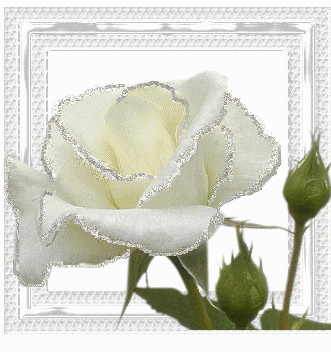
|
|
|
|
|
   Love and Light for the fallen soldier Love and Light for the fallen soldier  
|
|
|
|
|
   Love and Light for the fallen soldier Love and Light for the fallen soldier    For All like my Uncle For All like my Uncle    who have paid the Ultimate Price who have paid the Ultimate Price   & for all those who have been injured in the line of fire & for all those who have been injured in the line of fire   for those who have lost your limbs during your tour of duty for those who have lost your limbs during your tour of duty   We love you We love you    & We thank you & We thank you     We won't ever forget You We won't ever forget You    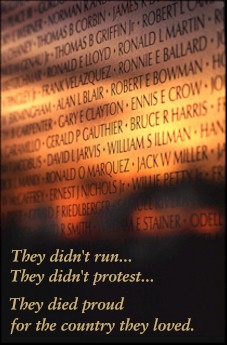 |
|
|
|
|
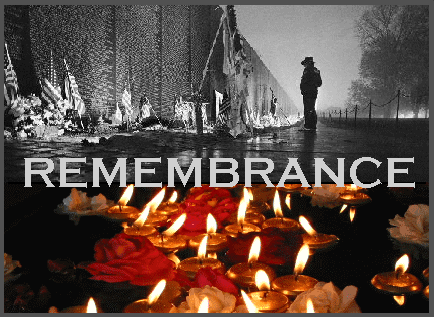
|
|
|
|
|
|
To those who've payed the ultimate price for the freedoms so often taken for granted, may your rest be peaceful and rewards great.
To those who live and work in shades of hell knowing every second could be your last, you are honored and loved. You do your duty, and you remain steadfast. You give your all and hold nothing back and for that we salute you, honor you, love you, and thank you. ARMY NAVY AIRFORCE MARINES COAST GUARD NEVER FORGOTTEN. |
|
|
|
|
|
To those who've payed the ultimate price for the freedoms so often taken for granted, may your rest be peaceful and rewards great. To those who live and work in shades of hell knowing every second could be your last, you are honored and loved. You do your duty, and you remain steadfast. You give your all and hold nothing back and for that we salute you, honor you, love you, and thank you. ARMY NAVY AIRFORCE MARINES COAST GUARD NEVER FORGOTTEN.    Amen ... {{{ <<< Kindred2Wicked >>> }}} Amen ... {{{ <<< Kindred2Wicked >>> }}}   (casting crowns)A Tribute To Our Soldiers(very sad video) http://www.youtube.com/watch?v=cbRGksthTHQ&feature=related |
|
|
|
|
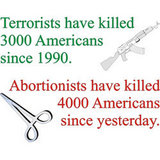
|
|
|
|
|
                
|
|
|
|
|
|
No person does a better job at honoring our soldiers than you Vanessa. I am proud of our soldiers and I am even prouder of you.
|
|
|
|
|
   Prayers for the Fallen Soldiers Prayers for the Fallen Soldiers  
|
|
|
|
|
   It is time for us to honor our fallen soldiers It is time for us to honor our fallen soldiers  
|
|
|
|
|










